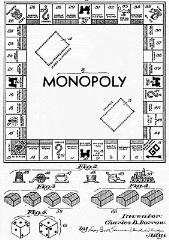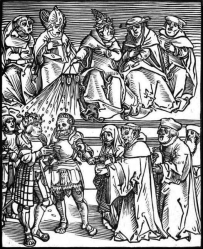Feedback is a funny thing. I'm not talking about the social feedback you give to another person after an interaction (or am I?). I'm talking about the physical principle of feedback where you take the output from a process and feed parts of it back into the input of the same process.
 A little more than a year ago, I decided to step away from social networks. It's time now to look back at that year, and count all the ways this was a positive or negative change. Spoiler: it was ALL GOOD.
A little more than a year ago, I decided to step away from social networks. It's time now to look back at that year, and count all the ways this was a positive or negative change. Spoiler: it was ALL GOOD.
 Yesterday I uninstalled the Twitter, Facebook and LinkedIn apps from all my devices and I closed the tabs I had pinned on my computer. I didn't delete my accounts, but I'm drastically changing how I'll use those services going forward. I'm doing this for a number of reasons that I'll explain in this post. It's not because I'm better than thou, but because I hope I can convince you to do the same.
Yesterday I uninstalled the Twitter, Facebook and LinkedIn apps from all my devices and I closed the tabs I had pinned on my computer. I didn't delete my accounts, but I'm drastically changing how I'll use those services going forward. I'm doing this for a number of reasons that I'll explain in this post. It's not because I'm better than thou, but because I hope I can convince you to do the same.
 The past two days have been nerve wracking for the French, and for friends of freedom of speech. We’ve all been floored by the savagery of the attacks, but it’s been heartwarming to see support messages from all over the world, as well as the extraordinary unity of the French people overall, including the Muslim community and clergy, as well as all other confessions (but of course, let’s not fool ourselves, there are already brain-dead violent reactions against the whole Muslim community, which is exactly the sort of division the terrorists are trying to create).
The past two days have been nerve wracking for the French, and for friends of freedom of speech. We’ve all been floored by the savagery of the attacks, but it’s been heartwarming to see support messages from all over the world, as well as the extraordinary unity of the French people overall, including the Muslim community and clergy, as well as all other confessions (but of course, let’s not fool ourselves, there are already brain-dead violent reactions against the whole Muslim community, which is exactly the sort of division the terrorists are trying to create).
 I’ve been watching this video of Rachel Maddow interviewing Rand Paul about civil rights. Paul’s argument is that private businesses should be left free to discriminate, because Liberty. I think he’s profoundly wrong, here’s why.
I’ve been watching this video of Rachel Maddow interviewing Rand Paul about civil rights. Paul’s argument is that private businesses should be left free to discriminate, because Liberty. I think he’s profoundly wrong, here’s why.
 It should be pretty clear at this point that our patent system is broken. It’s been designed to foster innovation, but is nowadays stifling it. It’s supposed to protect inventors, but instead threatens innovators. Patent trolls are extorting billions of dollars from our top tech companies, and are threatening to do the same to small businesses and individuals. Meanwhile, big corporations amass enormous patent portfolios that they use as currency, with contents so vague that they can be used to attack their smaller competitors before they even start: if you want to start a small technological business today, don’t do a patent search: you are going to find patents broad enough to cover your innovation, and you may have to give up for fear of litigation that would kill you from the legal fees alone.
It should be pretty clear at this point that our patent system is broken. It’s been designed to foster innovation, but is nowadays stifling it. It’s supposed to protect inventors, but instead threatens innovators. Patent trolls are extorting billions of dollars from our top tech companies, and are threatening to do the same to small businesses and individuals. Meanwhile, big corporations amass enormous patent portfolios that they use as currency, with contents so vague that they can be used to attack their smaller competitors before they even start: if you want to start a small technological business today, don’t do a patent search: you are going to find patents broad enough to cover your innovation, and you may have to give up for fear of litigation that would kill you from the legal fees alone.
 The little town in a remote corner of Arizona had been living in fear since Jim Coldhands and his band of outlaws had decided to stop here on their way to nowhere. They had taken the biggest house in town at gunpoint and were robbing the bank every week, leaving the townsfolk only the bare minimum to survive. They had the guns, and according to them, it was generous on their part to let anyone live. The sheriff was just as frightened as anybody else.
The little town in a remote corner of Arizona had been living in fear since Jim Coldhands and his band of outlaws had decided to stop here on their way to nowhere. They had taken the biggest house in town at gunpoint and were robbing the bank every week, leaving the townsfolk only the bare minimum to survive. They had the guns, and according to them, it was generous on their part to let anyone live. The sheriff was just as frightened as anybody else.
 It’s becoming increasingly clear that our so-called democracies really are plutocracies and always have been. But, I hear you ask, aren’t elections the guarantee that we the people are getting represented properly? Of course not.
It’s becoming increasingly clear that our so-called democracies really are plutocracies and always have been. But, I hear you ask, aren’t elections the guarantee that we the people are getting represented properly? Of course not.

In order to find out, I think it’s important to look at what it can’t be. What it can’t be, unless you have a taste for the perverse twisting of words, is religious tyranny.
 A few days ago, French satirical journal Charlie Hebdo was fire-bombed. The decent part of French society condemned the terrorist attack and offered its help. Even Prime Minister François Fillon, who is politically diametrically opposed to the journal, had some nice words of support.
A few days ago, French satirical journal Charlie Hebdo was fire-bombed. The decent part of French society condemned the terrorist attack and offered its help. Even Prime Minister François Fillon, who is politically diametrically opposed to the journal, had some nice words of support.
The picture should be very clear: we have on the one side a legitimate press organization doing its job, freely expressing opinions and thoughts. On the other hand, we have despicable terrorists who are trying to silence people through violence and fear. I for one stand with the press, against the terrorists. Sounds easy, right?
